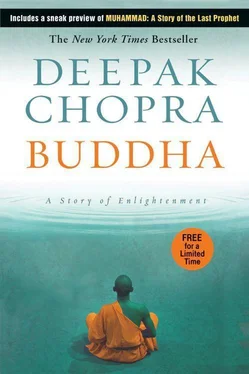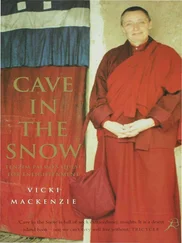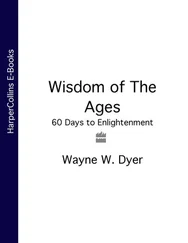Hard as he tried, Gautama could not conceal the anguish in his voice. Ananda reached out and grabbed his hand. “Go home, put everything back in order. I’m not brilliant like you, but if I caused so much pain to my family, I would consider it the same as betraying God.”
This speech moved Gautama, but as he considered what Ananda had said, his face grew darker. “You’re condemning me to a trap, my friend. I set my whole heart on meeting God. I abandoned everything for his sake. If that is the same as betraying God, my situation is hopeless. So is yours, and everyone’s here.”
There were more arguments that afternoon, more pleas from Ananda, but Gautama had made up his mind. The skies were so dark that they blended seamlessly into nightfall. Gautama didn’t permit Ananda to keep vigil beside his cot until dawn; he recalled how much it had hurt when he woke up to find Ganaka gone.
“Before we part, I want you to understand something,” he said. “I was raised in a palace, but I was a prisoner there. I had only one friend, so I spent hours alone or with the servants. What most fascinated me were the silk weavers. I discovered them bent over their looms in a tiny upstairs chamber. The room was full of the smell of indigo and saffron. The weavers didn’t talk among themselves; all I heard was the clack of shuttles running back and forth.
“There was one old woman, stooped and nearly blind, who did something I couldn’t understand. If a thread snapped, she would unload her loom completely and start over again. I asked her why she destroyed a week’s work over a single thread. She answered me in a word: karma.
“Karma keeps good and evil in balance. Karma is a divine law. When the law is violated, however innocently, it can’t be undone. One snapped thread alters the whole design; one misdeed alters a person’s destiny.”
Ananda listened carefully, wanting to remember every word from Gautama in case they never met again. “So the thread of your life has been broken,” he said.
“I thought it broke the day I left home. But I was naive. When I ended as Siddhartha, his karma continued to follow me. I feel as troubled as the day I left my wife and child a year ago. My hunger is for freedom, but the trap keeps closing tighter. Instead of attacking me directly, the demons sow discord everywhere around me. There’s only one thing left to try.” Gautama had skirted the truth, that the demons actually feared him.
“But what are you going to do?” Ananda pleaded, trying not to think about how alone he would be after this night.
Gautama wanted to protect his intentions, but he relented a little. There was a good chance that he would fail, and if that happened he would return home, not try to find the next guru. “Death has been stalking me since the day I was born. Eventually, no matter how hard I struggle, death will win-the hunter will kill his prey. But until then I have one chance to turn the tables. If I move quickly, I may be able to kill death first. There’s no other way, not if you want to be free.”
IN A COUNTRY where villages were a day apart and travelers hugged a strand of road winding through miles of uncharted wilderness, Gautama could disappear into the green world and never be seen again. He set out to do just that, but it was too dangerous to go alone. Tigers don’t mind eating idealists. Therefore, once he had left Udaka’s camp behind, Gautama searched for more rigorous company. They would have to be monks. They would have to be willing not to talk for days or weeks at a time. Finally, they would have to push their bodies so far that only two choices remained: bursting through to freedom or perishing in mortal form.
Gautama made the same proposition to every monk he encountered: “Come with me and defeat your karma once and for all. Death is playing a game with us. It’s a long game, but in the end the outcome is certain. Now’s your only chance to defeat the pain and suffering that became your inheritance the day you were born.”
These words were not strange; every holy man knew that the world was an illusion. The Vedas talked about it endlessly. But each monk who heard Gautama shook his head and looked away guiltily. “Your truth is too harsh, brother. I’m already living a life that ordinary people consider impossible. One day I will meet God, but if I try to force his hand, the only reward I may get is that I kill myself.”
Some put it this way, some another, but no one braved Gautama’s challenge. The more eloquent he grew, the more reluctant they became. “You look holy, but you may be a silver-tongued demon,” one old monk reminded him. Eventually Gautama did find company, but not with his words. He ceased to eat more than a handful of rice a day. His body wasted away, and as his skin became a taut, translucent membrane clinging to his bones, Gautama acquired a glow. His hands, which he held out to bless anyone who asked, looked larger, as did his deep brown eyes. This aura of saintly emaciation attracted five other monks, and once the band had gathered, Gautama led them upriver into the high country, where they found a large isolated cave.
It was a breathtaking place to suffer in. The sentinel peaks of the Himalayas ringed the far horizon. The air was crisp and cold as the first ice crust on a pond in winter. Gautama would wake up with supersensitive hearing. The faint air currents sweeping up the valley sounded like the breathing of the world. But rain made his bones ache, and thunder split his head open-it would throb with pain for days. For some months he and the five monks sat in their cave, doing the minimum of speaking, collecting roots for food, filling their gourds from a stream.
At first Gautama was worried that he was indulging himself, because no matter how austere the conditions, he loved the life of austerity. Perhaps too much. He tried sitting in the snow for hours to see if he could make his body hurt so much that it would give up all its hopes for pleasure. Day after day he repeated this, and then a miracle happened. Through the heavy falling snow he saw a stranger walking toward him. At first he was only a blurred dark shadow against the whiteness, but as he came nearer, Gautama saw that it was not a man who had braved the storm but the god Krishna. He had the most serene and beautiful face; his skin was a deep blue-purple that was all but black.
Gautama prostrated himself in the snow. “I have waited to meet you all my life,” he murmured. “I have abandoned everything for you.”
“I know,” Krishna said. His voice rang among the mountains like dull thunder. “Now go home and don’t do anything so stupid again.”
The god turned his back and walked away. At that instant Gautama woke up, shivering and starving. The skies were clear; there was no snowstorm. He returned to the cave but said nothing to the five monks. Maybe he’d only had a dream; maybe Krishna was real. In either case Gautama was determined not to heed a delusion. But he needed some kind of sign that his war against death was succeeding. All he got was that his mind started to rebel. At first it complained of being lonely and afraid. It argued that Gautama was hurting himself needlessly. In this phase the voice Gautama heard in his head was whining and weak, like a small child’s. As the weeks passed, however, his mind grew fiercely angry.
Gautama wanted to hasten its surrender, so the more his mind ranted, the more he deprived himself. He would sit naked all night on a frozen lake while his mind screamed in agony.
If you want to kill me, do it now, Gautama said defiantly. He didn’t know who he was addressing, exactly. Perhaps not his mind but Yama, the lord of death. When dawn came and he wasn’t dead, Gautama exulted. He had gotten his sign, because the cold and the elements had not defeated him. He was still alive, which proved that he was stronger than sun, wind, and cold.
Читать дальше












